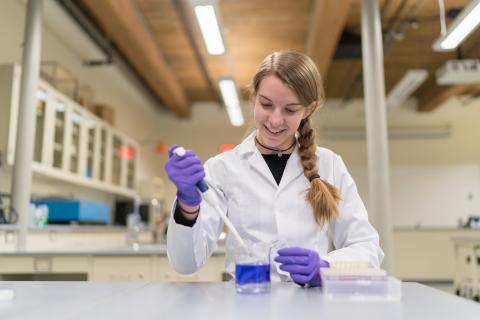
Lizz Maurais ’19 is set to graduate from UNH Manchester this May, a year earlier than she initially expected. But in just three years, the biotechnology major has earned multiple research awards, examined pancreatic cancer cells, researched microbial genomics and spent 10 weeks at a laboratory in California.
Maurais’ knew what she wanted to study when she got to college—her interest in science sparked when she was just six years old. But it was a research opportunity with Dr. Kristen Johnson, assistant professor of biotechnology, that led Maurais to her real passion.
“At the start of my second year at UNH Manchester, Dr. Johnson took me on as a student to work on her human pancreatic cancer cell research,” Maurais said. “This is when I fell in love with the laboratory and realized that science went far beyond what they teach you in laboratory classes.”
Maurais received UNH Hamel Center’s Undergraduate Research Award and the Manchester Undergraduate Project Support grant to fund her research with Johnson, whose work examines the different genes that cause normal cells to change into pancreatic cancer cells. Maurais worked specifically with the FOXN2 gene, studying the characteristics of cancer cells to determine if they behave differently than unaffected cancer cells.
Maurais also credits Dr. Kyle MacLea, assistant professor of biology, for his research mentorship. She worked as an intern in MacLea’s microbial genomics lab, isolating DNA from bacterial species to send out for sequencing. It was also MacLea who shared a link on Facebook to another research opportunity, one that took Maurais to the California Institute of Technology in Pasadena.
Maurais was selected for Caltech’s competitive Amgen Scholars program, which provides research opportunities to visiting students who are interested in pursuing a Ph.D. or M.D./Ph.D. program in STEM fields. The 10-week program included seminars by Caltech faculty and scientists, academic and professional development for research careers, special field trips and, of course, laboratory research.
“While at Caltech, I studied the changes in neuron morphology after a fruit fly had been exposed to an odor for a period of days during its development, as compared to flies that had not been exposed to a specific odor,” Maurais said.
From cancer to bacteria to fruit flies, Maurais has gotten diverse experience in the lab—experience she says will prepare her for pursuing a Ph.D.
“Research has taught me patience, to accept failure and unexpected results, and that a great mentor can make all the difference,” Maurais said. “I hope and believe that the research experience has prepared me for my impending career as a graduate student.”
Maurais thanks the faculty for their guidance, encouragement and insight into opportunities, which she said drastically impacted the direction of her future career goals. Her advice to other students is simple: Talk to your professors about your future.
“Your professors are your greatest resource,” Maurais said. “I cannot thank them enough for giving me countless opportunities and golden nuggets of advice.”
Interested in laboratory science? Check out our biotechnology or biological sciences programs.